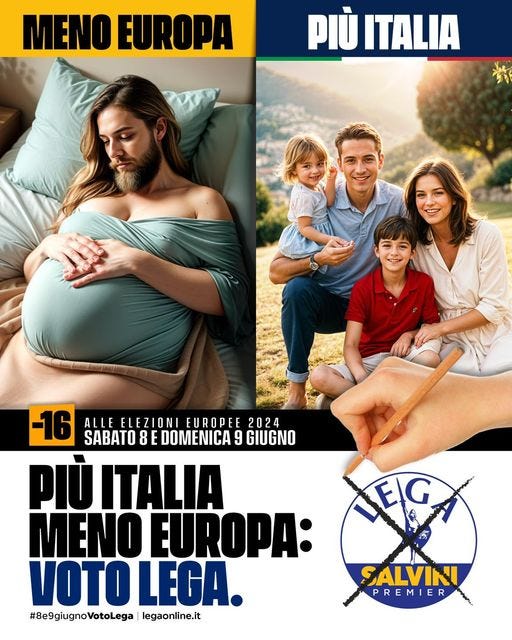Why Salvini Is Mistaken?
The Lega party launched the campaign "Less Europe, More Italy." Big mistake.
Days before the European elections, a peculiar campaign unfolds in Italy.
The Lega party, led by Matteo Salvini, has launched a campaign with the slogan "Less Europe, More Italy."
The campaign contrasts images of Europe on one side and Italy on the other. Images portraying ultra-progressive ideals are placed alongside Europe, while those representing normalcy align with Italy.
For instance, consider the following images:
This post isn't about debating the merits of consuming insects but rather about acknowledging my agreement with Salvini's concerns. I believe it's valid to uphold traditional family values and cherish our gastronomy.
Now, the title of this post is "Why Salvini Is Mistaken?"
I've previously written about this issue. The problem lies in Salvini and many European conservatives equating the EU with leftist ideologies. They hand over to the left, whom they vehemently oppose, the notion that the EU was, is, and will be their brainchild.
It doesn't matter that the founding fathers were from the Christian Democracy; no, the EU is "communism."
The major flaw in this discourse is that while it might resonate with older demographics, it fails to sway the youth.
Let's recall a study indicating that approximately 71% of young Europeans support the EU. In terms of identity, about 67% of young people in the EU consider themselves "European" first, before identifying with their own country. Even within conservative and nationalist youth circles, there exists a sense of brotherhood with other European nations.
Young people need Europe for more job opportunities, for defending our borders, and for fostering a better economy conducive to forming the traditional families Salvini claims to champion.
Continuing this campaign of demonizing the idea of Europe is counterproductive and detrimental to our future. It may attract the attention of older generations, but the youth, who wield increasing influence in Brussels, desire a united Europe.
Allow me to provide an analogy: Suppose the left governs Italy and proposes a progressive law, such as "Open Borders." No one from the right would blame Rome or Italy itself. (Well... let's remember Salvini did so when advocating for Padania's independence). The problem, in that case, would be the "open borders" policy and the government implementing it. That's what needs addressing.
So, I ask, can't we differentiate between the European government and the EU? Is it always necessary to vilify "Brussels" as the villain? This approach leads us nowhere.
If we want right-wing ideas to prevail, it's time to understand that "the EU is our home, it's the battlefield... not the enemy."
P.S.: Go out and vote!





